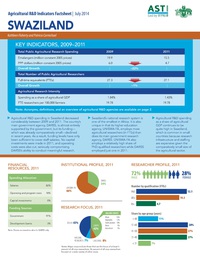Authors:
Kathleen Flaherty and Patricia Carmichael
Year:
2014
Publisher
International Food Policy Research Institute and Department of Agricultural Research and Specialist Services.
Back to:
Agricultural R&D spending in Swaziland decreased considerably between 2009 and 2011. The country’s main government agency, DARSS, is almost entirely supported by the government, but its funding— which was already comparatively small—declined in recent years. As a result, funding levels have only been sufficient to cover staff salaries. No capital investments were made in 2011, and operating costs were also cut, seriously compromising DARSS’s ability to conduct meaningful research.
Swaziland’s national research system is one of the smallest in Africa. It is also unique in that its higher education agency, UNISWA-FA, employs more agricultural researchers (in FTEs) than does its main government research agency, DARSS. UNISWA-FA also employs a relatively high share of PhD-qualified researchers while DARSS employed just one in 2011.
Agricultural R&D spending as a share of agricultural GDP continues to be quite high in Swaziland, which is common in small countries because research infrastructure and staffing are expensive given the comparatively small size of the agricultural sector.

